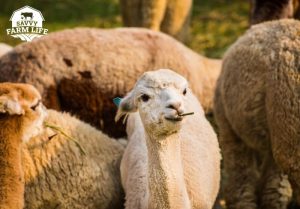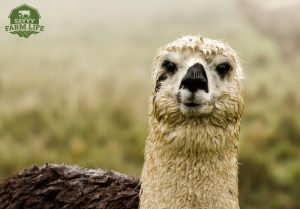
How to Avoid an Alpaca Spitting at You
One of the first questions that might come to mind when considering adding alpacas to your homestead is, ‘what about the spit?’ Most of us are familiar with spitting llamas and alpacas, and consider the idea of being spat on revolting. Why do alpacas spit?
Why do alpacas spit at you? Alpacas spit for a variety of reasons, including self-defense, food competition, and to ward off the advances of a persistent male. While alpacas, and other members of the camelid family, use spitting as a means of communication and intimidation, it is usually a last resort. When a human is spat on by an alpaca, it is often the result of being caught in the crossfire of an alpaca disagreement.
Getting spit on by any animal is gross. In this article, I’ll share some tips on how you can avoid getting spat on by an alpaca and the danger signs you can look for when an alpaca is about to spit. Keep reading!
Why Do Alpacas Spit?
Alpacas are more likely to spit on one another than their human handler. They may spit at one another to compete for food, to fend off mating advances, to protect their boundaries, and when feeling threatened.
Why Alpacas Spit: Food Competition
One of the most common reasons alpacas will spit at one another is when competing for food. If you bring your alpacas’ favorite treats out to the pasture, they will come running and will compete for the treats by intimidating one another. While alpacas will provide a few warning signs before letting loose with their stomach contents, they won’t hesitate to use spitting as a means of accomplishing their goal.
Why Alpacas Spit: Fending Off A Potential Mate
If a male is attempting to mate with an uninterested female, she may spit at him to warn him off – especially if he is not respecting her initial communication. Other than kicking, alpacas have few tools at their disposal to warn others away, so while alpacas do not necessarily enjoy spitting, they will do so in order to communicate that another needs to back off. When a female is being pestered by an eager male, she may spit at him as a last resort.
Why Alpacas Spit: Maintaining Boundaries
While alpacas are herd animals and they are happiest living with others of their kind, they do occasionally need their space. An alpaca may spit at another if irritated by the offender’s lack of boundary respect. Like humans, alpacas need their space – they don’t always want another animal in their face. They will try to warn the offender using other means of communication, but will ultimately do what needs to be done to force them to back off.
Why Alpacas Spit: Self-Defense
Alpacas are gentle animals with little means of natural self-defense. When threatened, an alpaca has few options in its arsenal – running, kicking, and spitting. No one wants to be on the receiving end of alpaca spit, and that includes predators.
Alpacas are prey animals, and while they are typically friendly animals, they are often wary of new people and animals. If an alpaca feels threatened, he will not hesitate to use spitting as a means of protecting himself and his herd.
Spitting On Humans
Alpaca spit is rarely directed at humans. The majority of humans who report being spit on by their alpacas were simply in the wrong place at the wrong time. I’ve only been spat on once by an alpaca and it was at feeding time when two alpacas were duking it out for their feed bucket. If you are in the line of fire of two alpacas working out their differences, you will be caught in the spit. This will be very unpleasant for you, but was unintentional on the alpaca’s part (of course, you shouldn’t expect an apology from the spitter).
Alpacas don’t always face one another when working out a disagreement. Often an alpaca will stand broadside – at a 90 degree angle to another; this position is intended to make the alpaca look bigger and more intimidating. An alpaca also may choose not to look another in the eye if he is more submissive than the others – he may reflexively spit even if he is not willing to confront the other face to face.
Warning Signs An Alpaca May Spit
 An alpaca will almost always deliver a warning before spitting. Spitting is a last resort, and is unpleasant for the spitter. So what are some of the warning signs to watch out for?
An alpaca will almost always deliver a warning before spitting. Spitting is a last resort, and is unpleasant for the spitter. So what are some of the warning signs to watch out for?
An alpaca will use both vocal and body language communication to warn that they are becoming irritated. The first sign that an alpaca is becoming irritated is often a grumble. This grumble sounds exactly like you would expect a grumble to sound – and is similar to the way a human may express irritation. Along with grumbling, an alpaca may raise her chin and flatten her ears to appear more intimidating. If you hear grumbling or see a raised chin or flattened ears, it would be best to back away (at least 10 feet!).
If an offending alpaca does not back off when its herd-mate grumbles and postures in the above way, she may then issue a loud snort. This is essentially telling an offender “watch out – things are about to get ugly”. If the snort is ignored, the alpaca will often issue a “dry spit”. A dry spit is simply the saliva that is already in the alpaca’s mouth, or even just air. If you notice an alpaca issuing a dry spit, you’ve got seconds to back off if things are going to take a turn for the worst.
If the dry spit and snorting are ignored, an alpaca will resort to a full, wet spit. The alpaca will bring forth the fermenting stomach contents and will hurl it at the offender. If this doesn’t cause the other alpaca to back off, probably nothing will.
To get a complete rundown of the vocalizations and behaviors alpacas use to communicate, visit my article Sounds Alpacas Make: Ultimate Alpaca Sounds Guide.
How To Prevent An Alpaca Spitting On You
If you want to prevent being spat on by an alpaca (and who doesn’t), you will need to become familiar with the personalities of your alpacas, and watch for warning signs.
As all alpacas will have different personalities, you will get to know your alpacas by spending time with them. You will become familiar with their triggers, and who is more prone to spitting in the herd. If caught in a scenario that might trigger a spitter, watch carefully for the warning signs, and be ready to move quickly.
If you are able to extricate yourself from the situation, do so at the first signs of a problem. Your alpacas will work out disagreements on their own – there is usually no reason for you to get involved.
How Often Do Alpacas Spit?
Part of what makes alpacas wonderful pets is their unique personalities. Each alpaca is an individual, and like humans, some will be more aggressive or grumpy than others. If you have an especially grumpy alpaca, she may be more quick to spit at her herdmates. If you have a particularly docile and friendly alpaca, she may rarely spit on another. Because of the bad taste, alpacas do not like to spit, so they will choose to use other means of communication before resorting to spitting.
What Is Alpaca Spit?
When you think of spit, you likely think of a glob of saliva. While none of us want someone’s saliva spat on us, the truth behind alpaca spit is even more repugnant.
When an alpaca is truly spitting on another, it will regurgitate its stomach contents and spit it out (up to 10 feet away!). While it is called “spit”, it could be more accurately described as “projectile vomit”. The spit that comes out of an alpaca’s stomach is fermented and acidic – most often a grassy, green glob. This spit does not smell pleasant either!
Spitting is not always a conscious choice on the alpaca’s part – it is a reflexive action. And while it is unpleasant to be spat on by an alpaca, it is just as unpleasant for the spitter. Alpacas are known to stand with their mouths hanging open after they spit, with green drool falling from their mouths. The taste is revolting to an alpaca, and they will often try to cleanse the palate by finding a tasty leaf or other treat to munch on. Feed that has come into the crossfire of alpaca spit will not be eaten.
Who Spits More Often: Llamas or Alpacas?
Both llamas and alpacas spit when threatened or to settle a disagreement, but alpacas tend to be more self-controlled in this regard than llamas. Llamas do spit more often than alpacas (and camels spit more frequently than llamas). So if you are interested in raising a herd in the camelid family but you are afraid of being on the receiving end of a wad of stinky spit, the alpaca may be a good choice for you.
How Long Can You Make It Without Being Spat On?
If you become familiar with the warning signs, you may go years without being spat on. Is there a way to guarantee that you are never spat on by your alpacas? Probably not – at some point you will let down your guard and may experience the wonder of alpaca regurgitation. Hopefully you will be close to a shower and a change of clothes when the inevitable happens.
If you’re interested in raising alpacas but don’t know where to start, check out my article Alpaca Care 101: How to Take Care of an Alpaca.
